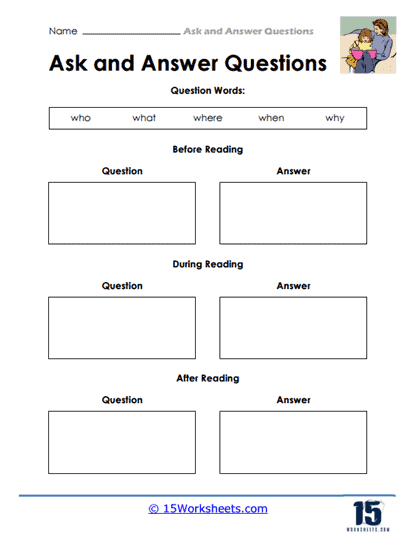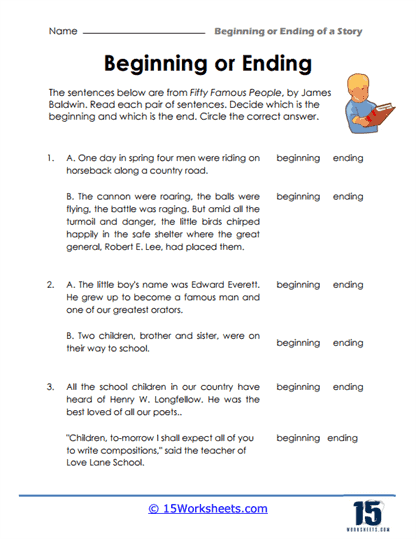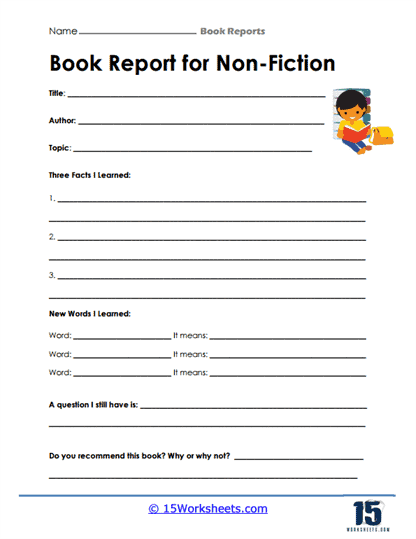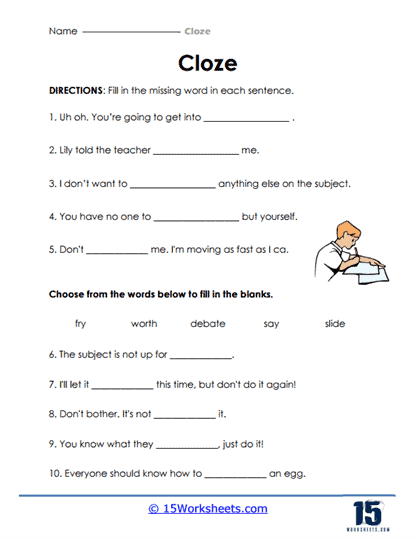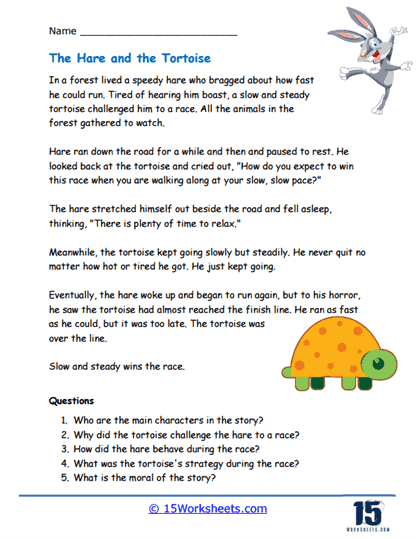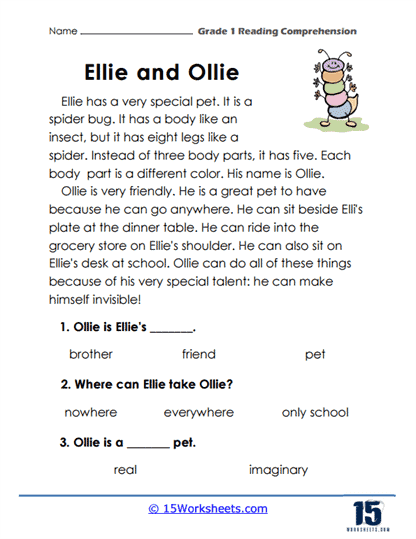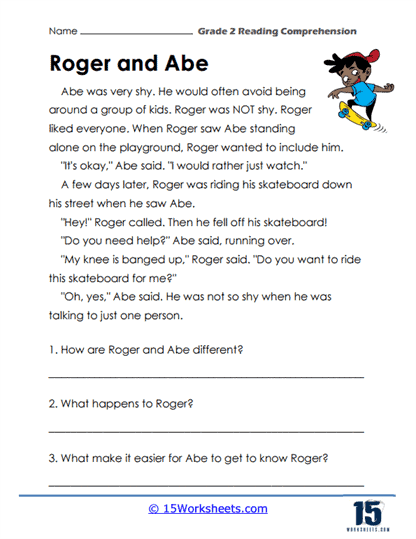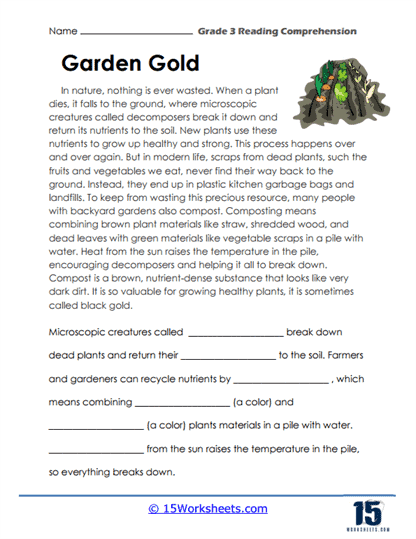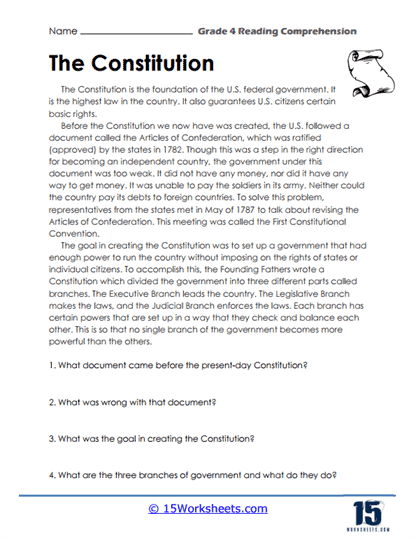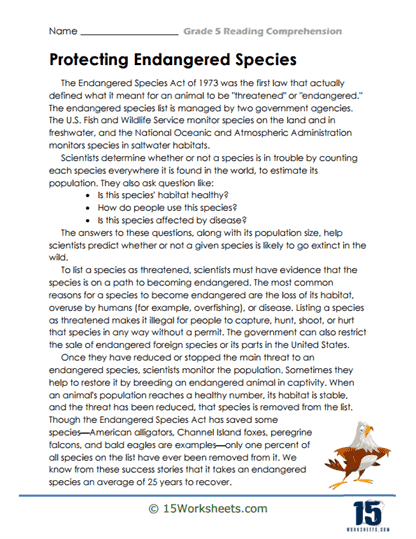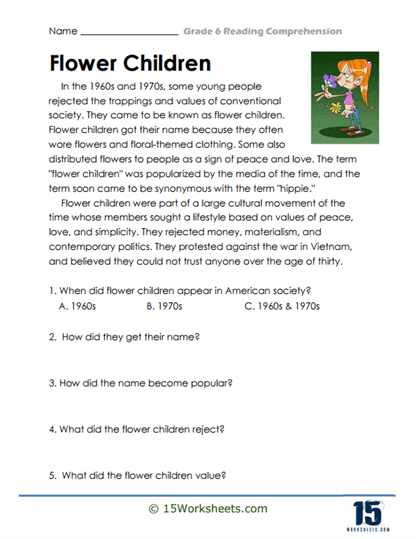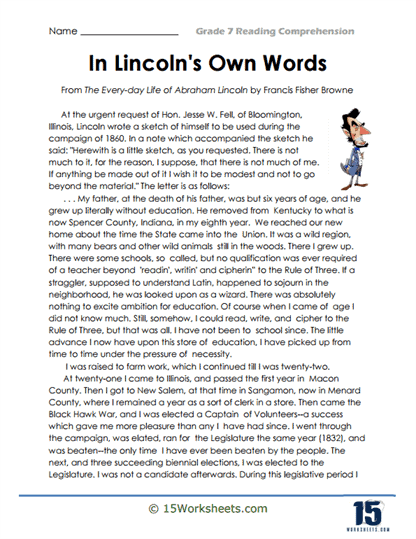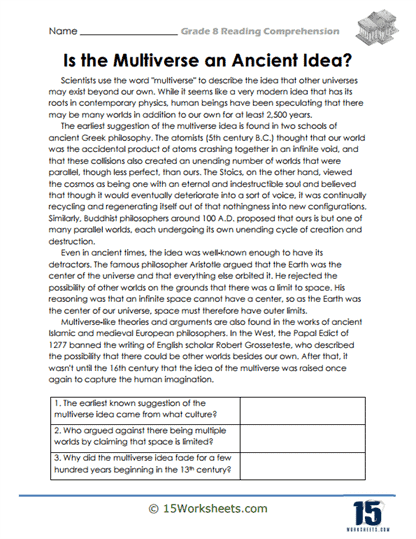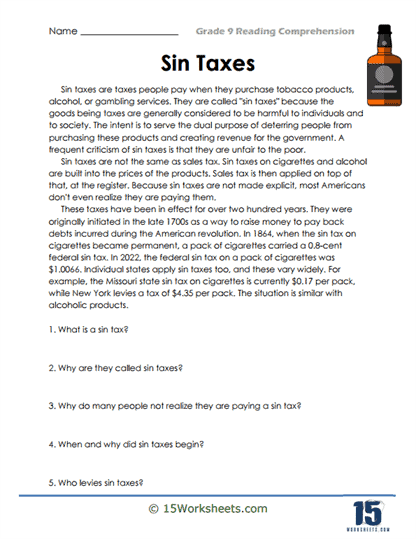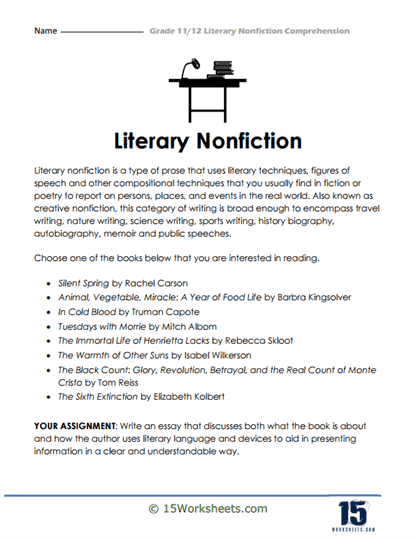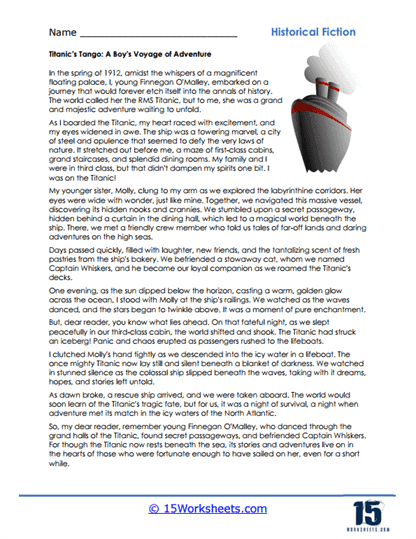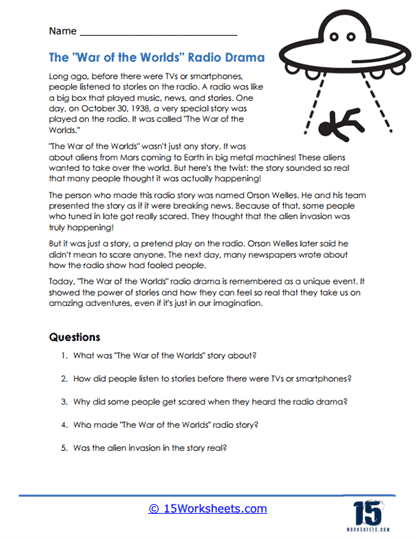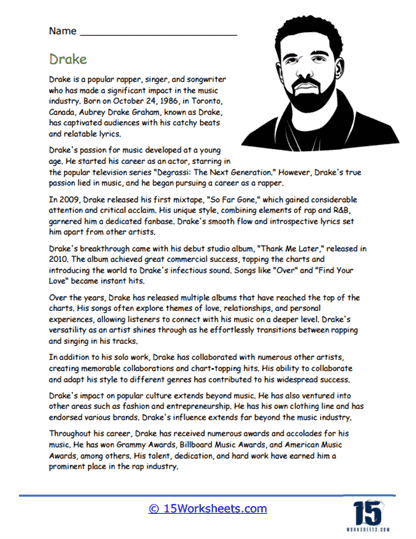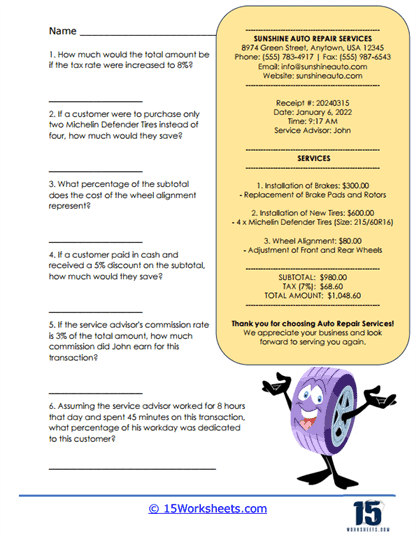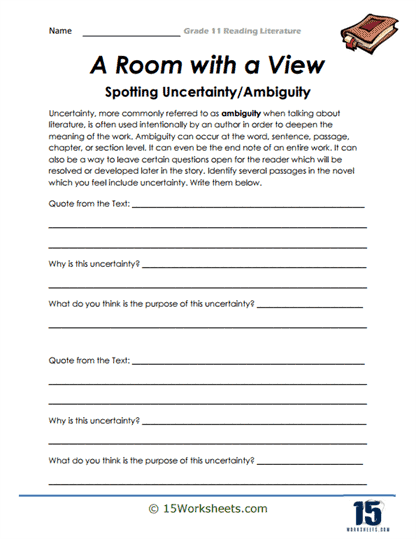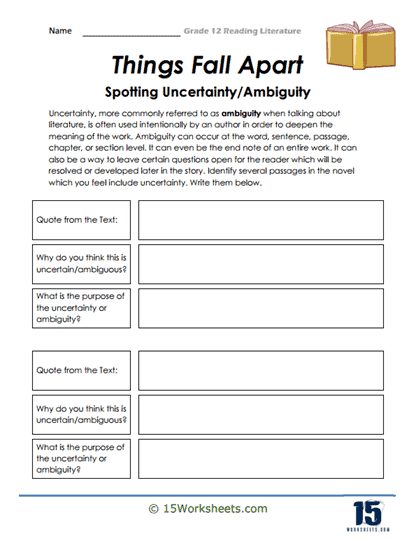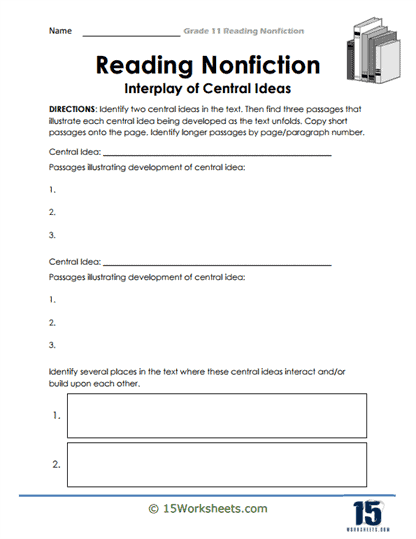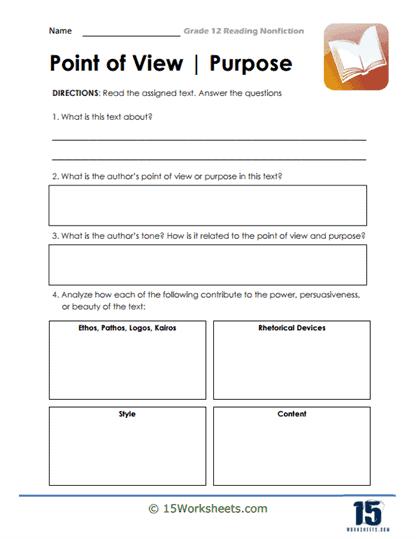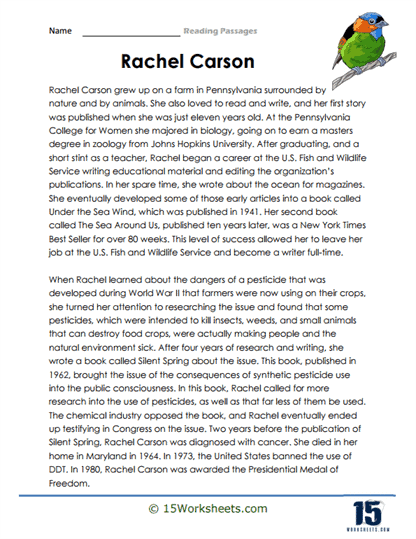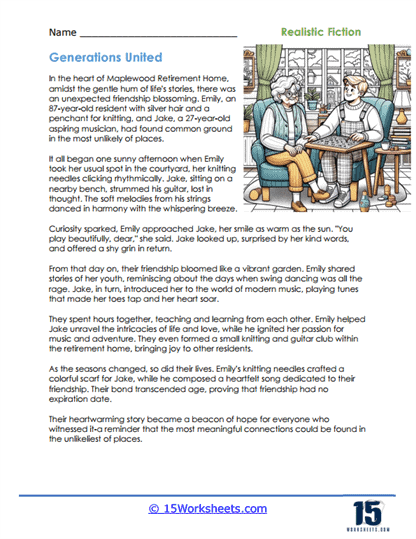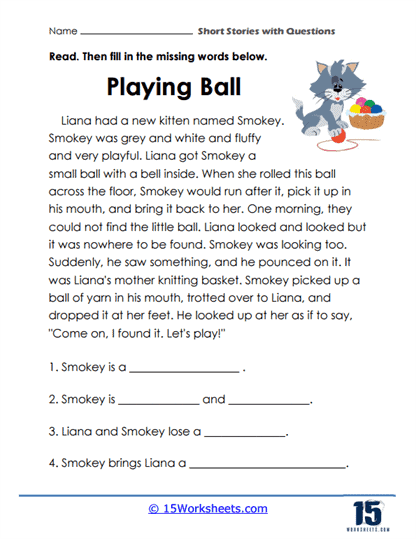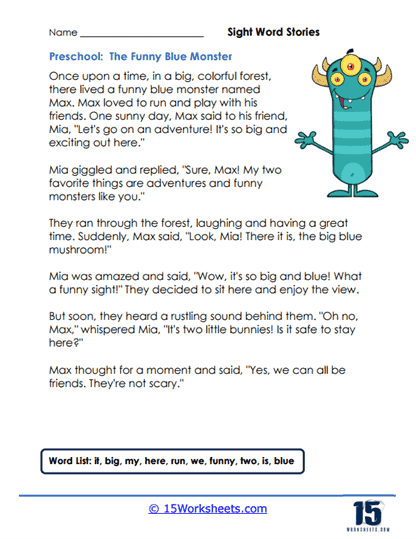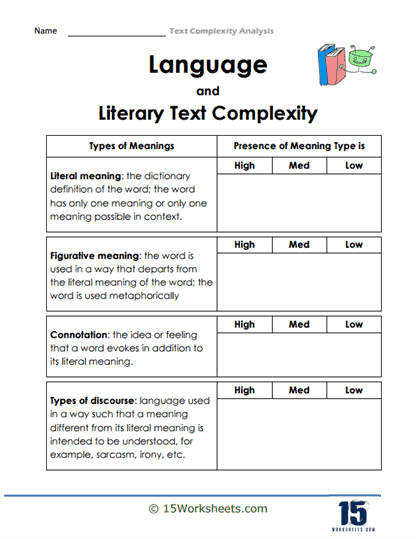Reading Comprehension Worksheets
About Our Reading Comprehension Worksheets
Our reading comprehension worksheets will help students develop the ability to understand, interpret, and analyze written texts. Typically, these worksheets present a passage followed by a series of questions that challenge the reader to engage with the content in a meaningful way. The questions can range from simple, fact-based inquiries to more complex ones that require critical thinking, inference, or personal interpretation. Worksheets may include fiction, non-fiction, poetry, or informational texts, exposing students to a broad variety of genres and writing styles.
These worksheets are particularly helpful for students as they target several key components of reading comprehension. They encourage close reading, which involves paying attention to details such as vocabulary, sentence structure, and narrative flow. This deep engagement with text promotes better retention and understanding of the material. Secondly, the accompanying questions help students practice extracting key information, such as identifying the main idea, summarizing, and understanding context, all of which are essential reading skills.
These worksheets are a useful tool in developing students’ language arts abilities. They often introduce new vocabulary within context, allowing students to deduce meanings and expand their lexicon. The questions may also address elements of grammar, punctuation, and writing style, which enhance a student’s overall command of the language. By encountering a variety of sentence structures and writing conventions, students improve not only in reading but also in writing, as they learn to apply these conventions in their own work.
In addition to honing technical reading skills, these worksheets can foster critical thinking. Students are often asked to analyze characters, themes, or the author’s intent, pushing them to think beyond the surface level of the text. By answering interpretive or evaluative questions, students learn to engage with texts on a deeper level, understanding the nuance, subtext, and broader implications of what they are reading. This critical engagement is particularly important for preparing students for more advanced academic work and for interpreting real-world information critically.
If you are looking for more deeply grade level literacy worksheets you may want to check out our new sister website that Becky one of reading teachers is working on exclusively these days. Becky does a great job and we think you will find it highly valuable.
Types of Exercise On These Worksheets
There are several types of exercises commonly found on reading comprehension worksheets, each targeting specific aspects of reading comprehension. Below, I will describe some of the different types of exercises typically included in these worksheets, along with explanations of how they can benefit students’ reading comprehension abilities.
Word Meaning – These exercises involve identifying the meanings of words in context. Students may be asked to use context clues to determine the meaning of unfamiliar words.
Synonyms and Antonyms – Students are tasked with finding synonyms or antonyms for specific words within the text. This helps broaden their vocabulary and deepen their understanding of word relationships.
Fact-Based Questions – Students answer questions that require recalling specific details or facts directly stated in the text. These questions help students develop the ability to locate and understand explicit information.
Main Idea Identification – Students identify the main idea or central theme of a passage. This exercise encourages students to focus on the most important information and understand the overall message of the text.
Drawing Conclusions – Students make logical inferences based on information presented in the text. These exercises encourage critical thinking and the ability to extrapolate meaning beyond what is explicitly stated.
Predicting Outcomes – Students predict what might happen next in a story or passage based on clues provided in the text. This fosters predictive reading skills and encourages students to anticipate developments in the text.
Character Analysis – Students analyze the traits, motivations, and actions of characters within a text. This exercise promotes deeper engagement with the text and enhances students’ understanding of character development.
Plot Structure – Students identify elements of plot, such as exposition, rising action, climax, falling action, and resolution. This exercise helps students understand how stories are structured and how events unfold over time.
Evaluating Arguments – Students assess the validity of arguments presented in the text and identify supporting evidence. This exercise promotes critical thinking and encourages students to analyze information critically.
Making Inferences – Students make educated guesses or draw conclusions based on evidence provided in the text. This fosters higher-order thinking skills and encourages students to think beyond the literal meaning of the text.
Identifying Text Structure – Students identify the organizational structure of a passage, such as cause and effect, problem and solution, or compare and contrast. This exercise helps students understand how information is organized within a text.
Summarization – Students summarize the main ideas and key details of a passage in their own words. This promotes comprehension monitoring and helps students identify the most important information in a text.
Context Clue Exercises:
Using Context Clues – Students use context clues to infer the meaning of unfamiliar words or phrases. This exercise improves vocabulary acquisition and helps students develop strategies for understanding unfamiliar vocabulary.
Contextual Understanding – Students demonstrate understanding of idiomatic expressions, figurative language, or cultural references within the text. This exercise enhances students’ ability to interpret language in context.
How These Worksheets Help Students
Improvement in Reading Comprehension Skills – Regular practice with reading comprehension worksheets helps students develop and refine their ability to understand written texts, including both fiction and non-fiction.
Expansion of Vocabulary – Vocabulary exercises on these worksheets expose students to a wide range of words and help them learn new vocabulary in context, which can enrich their reading experience and improve their overall language skills.
Enhanced Critical Thinking Skills – Analytical and inferential comprehension exercises encourage students to think critically about the text, make connections, and draw conclusions, fostering the development of higher-order thinking skills.
Increased Confidence – As students practice and improve their reading comprehension skills, they gain confidence in their ability to understand and engage with various types of texts, leading to greater academic success and enjoyment of reading.
Preparation for Academic Success – Strong reading comprehension skills are essential for success in school and beyond. Practicing with reading comprehension worksheets helps students develop the skills they need to comprehend complex texts, analyze information, and think critically, laying the foundation for academic achievement.
A Look At Our Topics
These worksheets encourage students to develop their critical thinking skills by posing questions requiring them provide answers that make sense, or vice versa. This practice enhances their ability to comprehend and analyze written materials effectively.
Beginning or Ending of a Story
This collection of worksheets focuses on the crucial aspects of storytelling-the beginning and ending. Students learn to identify key elements in a story’s introduction and conclusion, honing their understanding of narrative structure and its impact on comprehension.
Designed to foster a love for reading and literary analysis, these worksheets guide students in summarizing, reflecting on, and critiquing books they’ve read. They not only improve reading comprehension but also encourage thoughtful engagement with literature.
Cloze worksheets involve filling in missing words within a text, challenging students to use context clues to complete sentences. This exercise enhances both reading comprehension and vocabulary development.
This set helps students analyze similarities and differences between two or more texts, fostering critical thinking and comprehension skills. These worksheets enhance students’ ability to identify key themes, characters, settings, and plot structures, improving their overall reading and analytical abilities.
Through a collection of fables, students delve into timeless tales filled with moral lessons. These worksheets improve comprehension while encouraging discussions about ethics and values found in these classic stories.
Fiction Passages with Questions
Students are presented with short fictional texts followed by questions that assess their understanding of key details, themes, and inferences. These worksheets help students practice reading comprehension, critical thinking, and textual analysis, improving their ability to engage with and interpret literary works.
These sheets provide students with engaging stories from cultural traditions, followed by questions that test understanding of key elements like plot, characters, and themes. These worksheets help students develop reading comprehension skills while also exposing them to moral lessons and diverse cultural perspectives.
Grade 1-12 Reading Comprehension
These grade-specific worksheets cater to students from first grade through twelfth grade. They align with each grade’s curriculum, ensuring that students engage with texts appropriate to their developmental level, building their comprehension skills gradually.
In Grade 1, students primarily focus on developing foundational reading skills such as phonemic awareness, phonics, and sight word recognition. They learn to decode words by understanding the relationship between letters and sounds, practice reading fluently, and begin to build their vocabulary through exposure to new words. Additionally, students work on basic comprehension skills by identifying story elements and making connections between texts and their own experiences.
Grade 2, students continue to refine their foundational reading skills such as phonics, fluency, and sight word recognition. They also focus on expanding their vocabulary, deepening comprehension skills by identifying main ideas and details in texts, and making connections between different texts and their own lives.
In Grade 3, students further develop their reading skills by focusing on fluency, comprehension, and vocabulary expansion. They work on reading longer and more complex texts with increased understanding, identifying main ideas, supporting details, and making inferences, while also expanding their vocabulary through exposure to a variety of texts and explicit instruction.
In Grade 4, students continue to refine their reading skills by emphasizing comprehension strategies, vocabulary acquisition, and critical analysis of texts. They delve deeper into understanding the author’s purpose, making connections between texts, and synthesizing information from multiple sources, while also expanding their vocabulary through context clues and direct instruction.
In Grade 5, students focus on advanced comprehension skills such as analyzing text structure, drawing inferences, and evaluating author’s purpose and point of view. They also work on expanding their vocabulary through the study of word origins, prefixes, and suffixes, as well as encountering a wider range of genres and literary devices in their reading materials.
Grade 6, students hone their critical reading skills by analyzing complex texts for deeper meaning, identifying themes, and evaluating arguments and evidence. They also continue to expand their vocabulary through exposure to challenging texts and deliberate vocabulary instruction, while developing the ability to synthesize information from multiple sources to form cohesive interpretations.
In Grade 7, students focus on advanced comprehension skills such as analyzing author’s tone, mood, and figurative language usage, while also delving into more sophisticated text structures and literary devices. They refine their ability to make connections between texts, evaluate perspectives, and critically assess the credibility of sources, preparing them for more complex reading tasks in higher grades.
In Grade 8, students continue to refine their comprehension skills by analyzing texts for deeper meaning, identifying implicit themes, and evaluating the effectiveness of literary techniques employed by authors. They also focus on developing critical thinking skills through the examination of diverse perspectives, making connections between texts, and constructing well-supported arguments based on evidence from their reading.
In Grade 9, students refine their reading skills by engaging with more complex texts across various genres, focusing on deeper analysis, inference-making, and interpretation. They also develop their ability to evaluate the credibility of sources, discern authorial intent, and synthesize information from multiple texts to form cohesive arguments or responses.
Grade 10 Reading Comprehension
In Grade 10, students continue to enhance their reading skills by analyzing texts for deeper meaning, identifying literary devices, and exploring complex themes and character motivations. They also refine their ability to evaluate arguments, draw evidence-based conclusions, and communicate their interpretations effectively through written and oral expression.
High School Literary Nonfiction Comprehension
These worksheets delve into literary nonfiction, offering students the opportunity to analyze essays, speeches, and other nonfiction texts written with literary techniques. Students enhance their comprehension while exploring the creative side of nonfiction.
Students are given passages set in a historical context, followed by questions that test comprehension and the ability to connect fictional narratives with real historical events. These worksheets enhance students’ understanding of history while developing their reading and analytical skills by blending fact and fiction.
Covering a wide range of topics, informational text worksheets provide students with valuable skills for understanding nonfiction materials effectively. These worksheets also promote critical thinking and research proficiency.
Exploring the music industry, these worksheets introduce students to various aspects of music, from various famous artists to the business side. Students improve their comprehension while gaining insights into this dynamic field.
Nonfiction Passages with Questions
Offers students informational texts on real-world topics, followed by questions that assess their comprehension of facts, main ideas, and key details. These worksheets help students build critical reading skills, expand their knowledge on various subjects, and improve their ability to analyze and interpret nonfiction material.
These worksheets focus on poetry, encouraging students to analyze the language, imagery, and themes in poetic works. They enhance both reading comprehension and appreciation for the artistry of poetry.
These show kids how to interpret and analyze receipts, helping them understand costs, taxes, and totals in real-life purchases. These worksheets enhance practical math skills, such as addition, subtraction, and percentage calculations, which are useful for budgeting and financial literacy in everyday situations.
Students learn how to follow instructions, measure ingredients, and understand cooking terminology. These worksheets develop practical skills in cooking, reading comprehension, and math, which are valuable for meal preparation and fostering independence in daily life.
Reading Literature Comprehension Grade 11-12
These worksheets tackle complex literary works appropriate for eleventh and twelfth graders, helping students navigate and appreciate classic and contemporary literature while honing their comprehension skills.
Reading Literature Comprehension Grade 11
In Grade 11, students focus on advanced literature reading comprehension skills such as analyzing the historical and cultural context of texts, interpreting symbolism and allegory, and evaluating the impact of literary techniques on meaning and theme. They also refine their ability to make connections between texts, critically evaluate different interpretations, and articulate nuanced insights in written analyses.
Reading Literature Comprehension Grade 12
In Grade 12, students further refine their literature reading comprehension skills by delving into complex literary works, analyzing themes, motifs, and character development in depth. They also focus on synthesizing diverse perspectives, engaging with literary criticism, and crafting sophisticated written responses that demonstrate a deep understanding of the text’s nuances and broader cultural significance.
Reading Literature Nonfiction Comprehension Grade 11-12
Designed for eleventh and twelfth graders, these worksheets delve into challenging nonfiction texts. They empower students to critically analyze and engage with a wide range of nonfiction materials, preparing them for college and beyond.
Reading Nonfiction Comprehension Grade 11
In Grade 11, students focus on honing their nonfiction reading comprehension skills by analyzing complex texts, identifying rhetorical strategies, and evaluating the credibility and bias of sources. They also work on synthesizing information from multiple texts, recognizing author’s purpose and perspective, and critically evaluating arguments presented in informational texts.
Reading Nonfiction Comprehension Grade 12
In Grade 12, students refine their nonfiction reading comprehension skills by engaging with challenging texts, synthesizing complex information, and critically evaluating the validity and reliability of sources. They also focus on analyzing the author’s tone, purpose, and argumentation strategies, while developing the ability to construct well-supported arguments and responses based on evidence from their reading.
With a variety of texts and genres, reading passages worksheets provide students with the opportunity to practice comprehension skills across different subjects, fostering a well-rounded understanding of diverse materials.
This series presents stories that are believable and grounded in real-life situations, helping students analyze characters, settings, and events they may relate to. These worksheets enhance critical thinking, empathy, and problem-solving skills, making them valuable for understanding real-world scenarios and improving daily life decision-making.
This collection presents short stories accompanied by questions to assess students’ comprehension. It encourages students to explore narrative elements and draw conclusions from concise yet engaging stories.
These are simple, repetitive texts that emphasize high-frequency words, helping early readers recognize and memorize common vocabulary. These worksheets build reading fluency and confidence, enabling students to navigate everyday written language more effectively.
In an age of digital communication, these worksheets explore the world of social media. They teach students to analyze social media content critically, assess credibility, and navigate the digital landscape responsibly.
Through sports-related texts, these worksheets engage students with topics they’re passionate about. They improve comprehension while exploring the world of athletics, its history, and its impact on society.
Text complexity analysis worksheets equip students with the ability to assess the complexity of texts based on linguistic, structural, and conceptual features. This skill enhances their readiness to tackle diverse reading materials effectively.
These focus on teaching students to recognize and understand vowel combinations, like “ea” or “ai,” within the context of reading. By mastering these vowel teams, students improve their decoding skills and pronunciation, which enhances their reading fluency and helps them comprehend more complex texts in everyday life.

